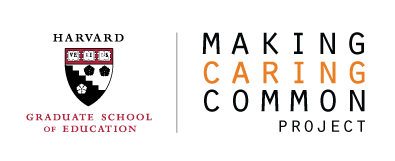Turning the Tide in 2022: An update on our college admissions work
Making Caring Common first published Turning the Tide (TTT) almost seven years ago. This report, which was endorsed by more than 150 college admission leaders, offered concrete suggestions for how a group of committed admission leaders, educators, and advocates could reshape the college admission process to better promote ethical character, improve access and equity for all students, and reduce excessive achievement pressure.
The report received substantial attention in the media (see examples here and here), from high school educators, from students and families in the throes of the college admission process, and from college admission leaders themselves. It resulted in colleges making a broad array of changes aligned with the report, such as adding new application questions about ethical character and clarifying that home commitments, such as taking care of a younger sibling or sick family member, “count” in the application’s activity section. The report also sparked a national discussion about the damaging messages we communicate to young people when admission focuses on certain narrow forms of achievement rather than meaningful engagement in learning and ethical character.
Since the launch of this first report, our college admission work has continued to flourish. And while some of these efforts have been less visible to the public than Turning the Tide, we’ve continued to make big strides in achieving our goals through deep conversations with colleges, meaningful collaborations with leaders in the field, and original research. Below are some highlights from this work.
Understanding and improving character assessment
In talking with many admission leaders about how they might emphasize and review ethical character in admission, we realized that many colleges needed support. We received a three-year grant from the John Templeton Foundation to better understand the landscape of ethical character assessment and review in both high schools and college admission offices. As part of this work, we collaborated with five colleges to develop, pilot, and evaluate a series of new tools and procedures related to the review of ethical character in admission. Some of these tools and procedures are still being used in admission offices today. What we learned from our collaborations with colleges and high schools informed a new Character Assessment in Admission Guide that we developed for use in a wide array of admission offices.
Promoting equity and access
We also worked to identify ways to advocate for and improve access and equity in admissions that did not duplicate the excellent work already being done by college access organizations throughout the country. We’ve gathered stakeholders from college access and admissions-focused organizations, tech giants, academia, and admission leaders to think together about new ways to disseminate essential information about college and the college admission process to underserved young people. We worked for almost two years with Google to improve the data that they provide to high school students about colleges so that these students can make more informed, wiser decisions, and taught a two-week course at the Harvard Graduate School of Education with Google staff on improving the college search process for underrepresented students.
“The report sparked a national discussion about the damaging messages we communicate to young people when admission focuses on certain narrow forms of achievement rather than meaningful engagement in learning and ethical character.””
We also researched and wrote a report in which we offered alternatives to traditional college pathways in an effort to increase access for all students. Finally, over the past two years, MCC has engaged in a close collaboration with the Common App to develop a promising set of ideas for better promoting equity and assessing both character and cognitive capacities in the Common App application. This includes a new question that is a simple checklist allowing applicants to share additional information about their lives and commitments, particularly those commitments that tend to be underreported on the application (taking care of a younger sibling after school, performing household tasks, and working at a job to contribute to family income).
Continuing the conversation
We’re also continuing the conversation about how colleges, admission leaders, educators, families, and students together can reshape the college admission process to elevate ethical character and increase access and equity for underrepresented students. We wrote a follow-up Turning the Tide report focused on the role of educators and parents in reforming the admissions process. At the start of the COVID pandemic, we worked with colleges to write a statement about what admission offices valued and expected (and didn’t expect) from applicants during the pandemic. This statement was signed by more than 360 admission leaders.
I’m proud of the impact that our work has had over the past 7 years—but I’m even more excited about where we’re going next. With a large national pilot related to our Common App work, promising new work related to access and equity, and the development of additional, exciting tools to strengthen colleges’ assessment of’ character in the admission process, there’s a lot on the horizon. Tune in again soon to learn about what we do next!
Posted by Trisha Ross Anderson, College Admissions Program Director






